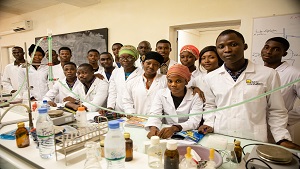Training of drugs specialists
— A public health issue in Southern countries —

Being given the ability to rely on their own drug specialists is an invaluable forward step for the countries of the South.
To further this progress, Fondation Pierre Fabre has made training a priority.
________
As is widely known, especially since the Kampala Declaration in 2008, the shortage of qualified personnel is a major obstacle to public health in the least-developed countries. Sending funding and medicines without the support of adequate human resources is an ineffective strategy over the long term.
Pierre Fabre was acutely aware of this reality when creating the Foundation. Which is why he focused his efforts on training pharmacists and drug specialists. He believed that integrating seasoned professionals into the healthcare systems of the least-developed countries was the only way to provide consistent, long-term access to quality medicines.
With the support of a network of French academics, the Foundation devotes its energies to updating the pharmaceutical curricula in countries of the South and overseeing training of teachers and students, sometimes to the doctorate level.
Though access to medicines is clearly part of the right to health, the WHO nevertheless estimates that two billion people do not have access to basic medicines (1). This is why training pharmacists in the Global South is a publichealth priority that the Fondation Pierre Fabre has chosen to support through a long-term commitment in partnership with health authorities in the Asian and African countries it assists.
This work – which entails forging interuniversity partnerships, updating curricula, modernising structures and training faculty – is pursued in accordance with each country’s priorities, with the objective of training specialists who have hands-on knowledge of the realities in the field and ensuring networks can function autonomously.
(1) World Health Organization, “Ten years of public health”, 2007-2017.

Noudy SENGXEU: Lecturer in analytical chemistry at the Laos University of Health Sciences Faculty of Pharmacy, thesis from the University of Limoges (Evaluating the Quality of Antiepileptics in South-East Asia).
Dr. Koffi KOWOUVI: Industrial pharmacist, galenic pharmacy assistant, pharmacy curriculum at the Faculty of Health Sciences at Togo’s University of Lomé, doctorate from the University of Bordeaux (Pharmaceutical Formulation of Methylene Blue for Treating Malaria)
 |
 |
 |
| Rehabilitation of the LNCQM — Conakry, Guinea — |
Upgrading of the Faculty of Phnom Penh — Cambodia — |
Creation of the Master Mekong Pharma — Cambodia, Laos, Vietnam — |
Follow our action
Twenty-five years ago, the Fondation Pierre Fabre was recognized as a public-interest foundation
This was an essential step for Pierre Fabre, who was personally involved in obtaining that status. This recognition provided the assurance of reliability and steadfast presence, and also authorized the receipt of grants, donations and bequests by virtue of its public-interest mission.
“Denis Mukwege, Nobel Peace Prize / Fondation Pierre Fabre” excellence scholarship to train healthcare professionals from the Global South
As part of its ongoing efforts to provide training and improve access to healthcare among vulnerable populations, the Fondation Pierre Fabre funds an excellence scholarship. It aims to support training in global health for healthcare professionals from the Global South, to lead scientific research work in the field of women’s health.
The Fondation Pierre Fabre trains tomorrow’s healthcare leaders
The Fondation Pierre Fabre has supported the training of more than 200 students from Africa and Asia since its beginnings. In this series of portraits, discover the men and women we have supported in their training.












